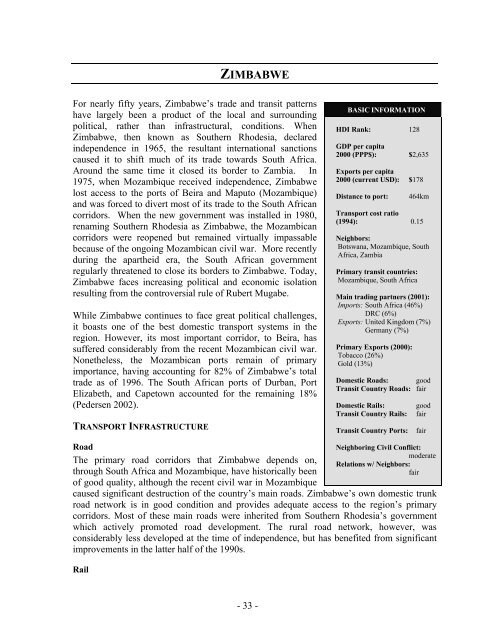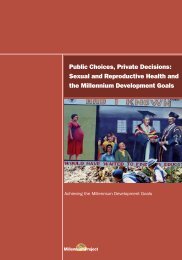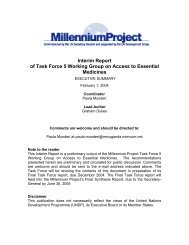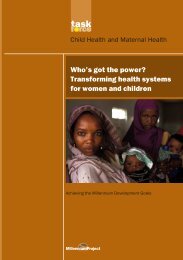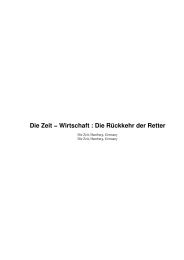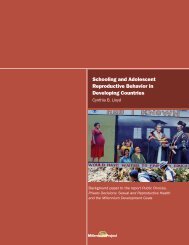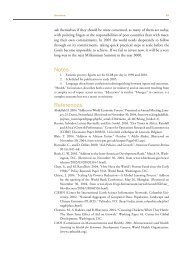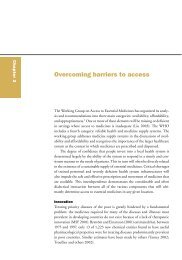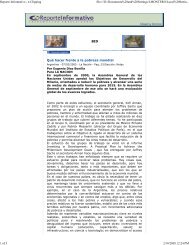the challenges facing landlocked developing countries: a case study ...
the challenges facing landlocked developing countries: a case study ...
the challenges facing landlocked developing countries: a case study ...
Create successful ePaper yourself
Turn your PDF publications into a flip-book with our unique Google optimized e-Paper software.
ZIMBABWE<br />
For nearly fifty years, Zimbabwe’s trade and transit patterns<br />
have largely been a product of <strong>the</strong> local and surrounding<br />
political, ra<strong>the</strong>r than infrastructural, conditions. When<br />
Zimbabwe, <strong>the</strong>n known as Sou<strong>the</strong>rn Rhodesia, declared<br />
independence in 1965, <strong>the</strong> resultant international sanctions<br />
caused it to shift much of its trade towards South Africa.<br />
Around <strong>the</strong> same time it closed its border to Zambia. In<br />
1975, when Mozambique received independence, Zimbabwe<br />
lost access to <strong>the</strong> ports of Beira and Maputo (Mozambique)<br />
and was forced to divert most of its trade to <strong>the</strong> South African<br />
corridors. When <strong>the</strong> new government was installed in 1980,<br />
renaming Sou<strong>the</strong>rn Rhodesia as Zimbabwe, <strong>the</strong> Mozambican<br />
corridors were reopened but remained virtually impassable<br />
because of <strong>the</strong> ongoing Mozambican civil war. More recently<br />
during <strong>the</strong> apar<strong>the</strong>id era, <strong>the</strong> South African government<br />
regularly threatened to close its borders to Zimbabwe. Today,<br />
Zimbabwe faces increasing political and economic isolation<br />
resulting from <strong>the</strong> controversial rule of Rubert Mugabe.<br />
While Zimbabwe continues to face great political <strong>challenges</strong>,<br />
it boasts one of <strong>the</strong> best domestic transport systems in <strong>the</strong><br />
region. However, its most important corridor, to Beira, has<br />
suffered considerably from <strong>the</strong> recent Mozambican civil war.<br />
None<strong>the</strong>less, <strong>the</strong> Mozambican ports remain of primary<br />
importance, having accounting for 82% of Zimbabwe’s total<br />
trade as of 1996. The South African ports of Durban, Port<br />
Elizabeth, and Capetown accounted for <strong>the</strong> remaining 18%<br />
(Pedersen 2002).<br />
TRANSPORT INFRASTRUCTURE<br />
BASIC INFORMATION<br />
HDI Rank: 128<br />
GDP per capita<br />
2000 (PPP$): $2,635<br />
Exports per capita<br />
2000 (current USD): $178<br />
Distance to port:<br />
464km<br />
Transport cost ratio<br />
(1994): 0.15<br />
Neighbors:<br />
Botswana, Mozambique, South<br />
Africa, Zambia<br />
Primary transit <strong>countries</strong>:<br />
Mozambique, South Africa<br />
Main trading partners (2001):<br />
Imports: South Africa (46%)<br />
DRC (6%)<br />
Exports: United Kingdom (7%)<br />
Germany (7%)<br />
Primary Exports (2000):<br />
Tobacco (26%)<br />
Gold (13%)<br />
Domestic Roads: good<br />
Transit Country Roads: fair<br />
Domestic Rails:<br />
Transit Country Rails:<br />
Transit Country Ports:<br />
good<br />
fair<br />
fair<br />
Road<br />
The primary road corridors that Zimbabwe depends on,<br />
through South Africa and Mozambique, have historically been<br />
of good quality, although <strong>the</strong> recent civil war in Mozambique<br />
caused significant destruction of <strong>the</strong> country’s main roads. Zimbabwe’s own domestic trunk<br />
road network is in good condition and provides adequate access to <strong>the</strong> region’s primary<br />
corridors. Most of <strong>the</strong>se main roads were inherited from Sou<strong>the</strong>rn Rhodesia’s government<br />
which actively promoted road development. The rural road network, however, was<br />
considerably less developed at <strong>the</strong> time of independence, but has benefited from significant<br />
improvements in <strong>the</strong> latter half of <strong>the</strong> 1990s.<br />
Rail<br />
Neighboring Civil Conflict:<br />
moderate<br />
Relations w/ Neighbors:<br />
fair<br />
- 33 -


